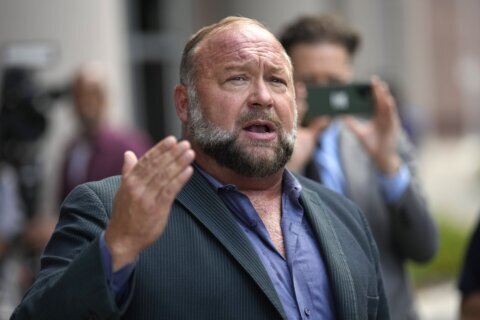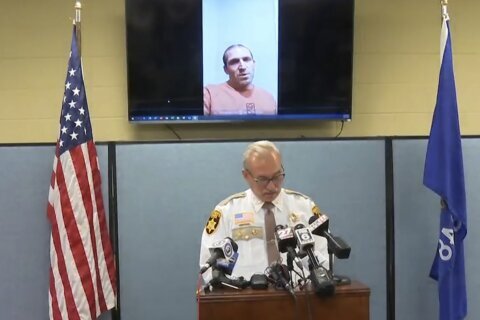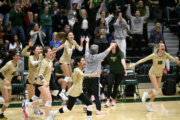It was a heart-wrenching choice. But when Daniel Gammerman decided to never set foot back in an Orthodox synagogue, he thought of it as an act of love. Not toward the Jewish community he was born into, but to himself.
“A synagogue is a spiritual place, but it’s also a community place,” said Gammerman, 47, from his home in Miami. “If I have to basically check at the door half of my identity in order to come in, I don’t feel that’s welcoming enough for me.”
Dozens of LGBTQ+ Jews like him have struggled to find support and acceptance within their Orthodox communities. Most were raised with little knowledge of what being gay or queer meant. They just felt different, but found it hard to ask their rabbis: “This is who I am, is there still room for me here?”
“The way it mostly works is invisibility,” Gammerman said. “There’s no addressing the existence of LGBT people among us. And, whenever you hear something about it, of course it’s negative.”
He can’t put his finger on a specific date in which he realized he was gay. But he remembers clearly what happened to him when the news got out.
“I used to get enormous texts from different people trying to explain to me how this was wrong,” Gammerman said. “It was a bombardment of people trying to fix me.”
Grandson to Eastern European Jews who fled during World War II, Gammerman was born in Brazil. He moved to the U.S. after finishing high school in the 1990s and continued his studies at a Jewish Orthodox university. At age 21, he got married. He and his wife — who he still thinks of as a friend — raised four children together.
“We built a perfect family,” he said. “I checked all the boxes of what a nice Jewish Orthodox family is supposed to be.”
Afraid to destroy his future and his children’s lives, he shut down his feelings for years, until he could do it no more.
He initially traveled to Brazil and met with a therapist who counseled gay men in heterosexual marriages. That helped, Gammerman said, but something was missing. What about his life within an Orthodox religious community that didn’t even acknowledge that LGBTQ+ people exist?
Embracing his true identity felt easier after meeting Steven Greenberg, an openly gay rabbi who founded Eshel, a U.S.-based organization focused on connecting LGBTQ+ Orthodox Jewish communities.
According to Miryam Kabakov, Eshel’s co-founder and executive director, most of the people who reach out share similar concerns: I’m coming out and I’ve been part of this community my whole life. Can I still belong? What will happen to me now? Can you find a rabbi who can help me?
“We guide them toward religious leaders who will tell them that there’s still a place for them,” Kabakov said. “That they still have the religious obligations and expectations that they’ve always had and that they should stay true to their heart and their tradition if that’s what they want.”
Ely Winkler, a 37-year-old LGBTQ+ Orthodox Jew from Brooklyn, will soon be back at an Orthodox synagogue after years of distancing himself from his community.
“After the war broke out between Israel and Gaza, I felt a deeper calling,” he said. “I didn’t feel strong enough to stand up for myself, for my beliefs, and I knew that I needed to strengthen my Judaism, to remember who I was.”
Abrielle Fuerst, 32, moved from Texas to Philadelphia six years ago. Eshel helped her to connect with a local rabbi and an inclusive synagogue.
“Here it’s not: ‘Oh, come because you are Jewish and gay, we’ll accept you.’ It’s just: ‘Hello, you’re Jewish, thanks for being in this space and it’s nice to meet you.’”
One of Eshel’s projects, named the “Welcoming Shuls,” enlists more than 200 rabbis who work across North America to make their synagogues hospitable for LGBTQ+ people. Many of them consent to being publicly identified; others ask to keep a low profile, foreseeing hostile reactions within their Orthodox communities.
“A lot of rabbis are very afraid to be public because they’ll get ostracized,” Kabakov said. “But we know they’re there.”
The group also counsels Orthodox LGBTQ+ Jews who wish to keep a distance from their religion.
“People who don’t want to be religious anymore are torn up about it,” Kabakov said. “But we try to help them through the struggle and let them know that they can be gay and be religious. It might be hard to find a place, but we’re working on that.”
Gammerman has tried to go back to Orthodox synagogues since he came out. Until now, none in Miami have made him feel truly accepted.
“I’ve tried many times, but it’s like wearing a costume,” he said. “At some point I was able to live with that. But the more you accept yourself, the more you love yourself, you just cannot do it.”
His Orthodox community did not prevent him from attending religious services after he came out, but rejection was still there. People stopped greeting him, and he was no longer allowed to officiate services at his synagogue. Once, during a speech, the rabbi looked at him and said: “Homosexuality is destroying humanity and if this continues like this, there’ll be no more children in the world.”
“I lost friendships, relationships, participation and community,” Gammerman said. “It was all gone really, really fast.”
Meeting Greenberg, who is married to another man and has a child, helped him realize he could still live a happy, fulfilling life. After their encounter, Gammerman decided to talk to his wife. The couple separated and found a way to break the news to their children.
“Since then, I have rebuilt my life,” he said. “I remarried. I have a husband. My children are part of my life and they understand.”
In time, he realized that not only his family, but his approach toward his religion would also need to change. At first he tried to attend liberal Reform synagogues, some of which fully embrace LGBTQ+ worshippers, but having been raised an Orthodox Jew, he still felt out of place.
“Being LGBT is a whole identity,” Gammerman said. “And I want to be embraced in a place where there are no buts or ifs.”
He’d rather not label his current religious observance, but Rosh Hashana and Yom Kippur still bear huge significance for him. So, every year, during the High Holy Days, he wakes up early, dresses nicely and opens his prayer book.
“I say the prayers from beginning to end,” Gammerman said. “I call to all the praises as if I was in a synagogue, but I do it by myself in my house.”
He was once taught that Jewish prayer required at least 10 men to be conducted, but he has learned a few things since.
“If I was given a switch that I could press to change who I am, I would not do it,” he said. “God made me like this, so it’s not up for me to switch. I have to love myself for who I am.”
___
Associated Press religion coverage receives support through the AP’s collaboration with The Conversation US, with funding from Lilly Endowment Inc. The AP is solely responsible for this content.
Copyright © 2024 The Associated Press. All rights reserved. This material may not be published, broadcast, written or redistributed.







